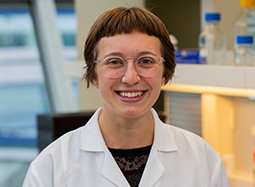Throughout the year, we highlight Van Andel Institute Graduate School’s doctoral students. This month, we’re featuring Rachel (Rae) House, a Ph.D. candidate mentored by Dr. Matt Steensma and Dr. Carrie Graveel. Rae hopes to find ways to “starve” cancer cells of the nutrients they need to survive, which could pave the way for new cancer treatments.
How would you describe your area of study to someone without a scientific background?

RH: I study how breast cancer cells use energy. Specifically, I want to know what “food” the cancer cells “eat” that the non-cancer cells don’t eat. If I can identify a food that the cancer cells rely on to grow, I can figure out how to “starve” them. The goal is to use drugs to put the cells on a “diet” and make the cancer cells more vulnerable to other therapies and drugs. If you didn’t eat all week and then ran a 5K, you’d have a hard time finishing the race. In the same way, if cancer cells can’t eat their food of choice, they’ll have a hard time surviving other treatments.
What is your primary motivation for persevering through graduate school?
RH: My partner, son, family, lab, and collaborators keep my spirits high, but it is the science that motivates me to keep going. A lot of science is following leads until you hit a dead end, but sometimes you arrive somewhere totally unexpected and it’s awesome. Grad school is difficult, but it’s the best job I’ve ever had!
What do you want to do with your degree?
RH: So many things! I love teaching, editing, data analysis and experimental optimization. I’m not certain where those interests will lead me.
Did you take time off before starting your Ph.D. degree or come directly from an undergraduate or master’s degree program?
RH: I graduated from college in December 2017 and started grad school in August 2018. Between graduating and grad school, I worked as an assistant tech in Dr. Ning Wu’s lab at VAI.
How has your previous coursework contributed to your breadth of knowledge?
RH: I attended a liberal arts college, and my liberal arts training directly inspired my integrative approach.
Do you think there is any value in social networking with other graduate students in non-related fields?
RH: Short answer: yes! Long answer: it depends on what you mean by “social networking.” I do not use most social media, so most of my networking happens at VAI and conferences. My thesis project integrates cancer, metabolism, and cell signaling topics, so I have to network and communicate with people in other fields. I know that working with people in multiple fields will strengthen my science.
How do you think earning an advanced degree will change your role in society?
RH: Growing up, I associated advanced degrees with advanced intelligence. Now that I am older, I know that intelligence is so much more than a degree and that being smart isn’t an end in and of itself. I see advanced degrees as a sort of social contract: to use your training to make the world a bit better in a way that is unique to you.
Did your past experiences in life or education help prepare you for graduate school or did you have to develop different strategies to succeed?
RH: My two internships under Dr. Ning Wu were scientifically formative. Dr. Wu is an integrative thinker and detailed experimenter, and she taught me many theoretical and practical skills.
What is your favorite stress-reduction technique?
RH: I’d love to say that I meditate or do yoga, but the truth is I eat a lot of Ben & Jerry’s ice cream and watch Brooklyn 99 on repeat.
What accomplishment (academic or other) are you most proud of?
RH: I am most proud of being a mom. My kid is the best thing that’s ever happened to me, but being a parent is really hard, especially being a first-time mom during COVID-19.
Why did you choose Van Andel Institute Graduate School?
RH: As I mentioned earlier, I interned in Dr. Ning Wu’s lab at VAI. When I had to decide what to do post-undergrad, I was torn between getting an architectural degree, tattoo apprenticeship, teaching license, or Ph.D. in molecular and cell biology. It was my experience at VAI that tipped the scales to pursue my Ph.D.
Has your perception of this Ph.D. program changed since you began the program?
RH: Since I worked at VAI before joining Van Andel Institute Graduate School, I knew the ins and outs of the program. I love the Graduate School, and I would 100% recommend it to anyone looking for a small but mighty molecular and cell biology program.
If you were asked to put something in a time capsule for each year you have been in the program and this capsule would not be opened for 25 years, what would you contribute?
RH: Year one: I would include a picture of my partner and I hiking at Hoffmaster State Park. Despite the stressors of grad school, we still managed to explore Michigan’s beautiful coast.
Year two: I would add two things: (1) a picture of my newborn son and (2) my comprehensive exam feedback.
Year three: I would put a printout of my first mass spectrometry run. I worked for over a year to create the cell lines that I profiled, and it was surreal to see the pilot analysis complete. The printout would serve as a reminder to keep going even when the end feels distant.
If you hadn’t been admitted to graduate school, what do you think you would be doing right now?
RH: I would be working as an architect, a high school teacher, or a tattoo artist.
Is there anything else you would like us to know about your doctoral education experience?
RH: If anyone wants to do science and get their Ph.D., I say, “Go for it!” We often paint doctoral education as uniquely challenging, but it is no different than any other job: some days are tough, and other days are great.
Interested in Van Andel Institute Graduate School? Learn more at vaigs.vai.org and read previous student spotlights here.
